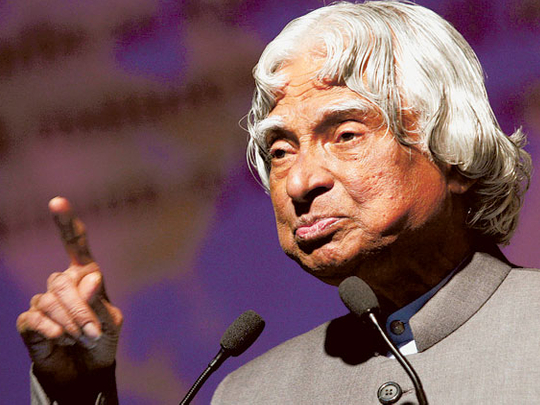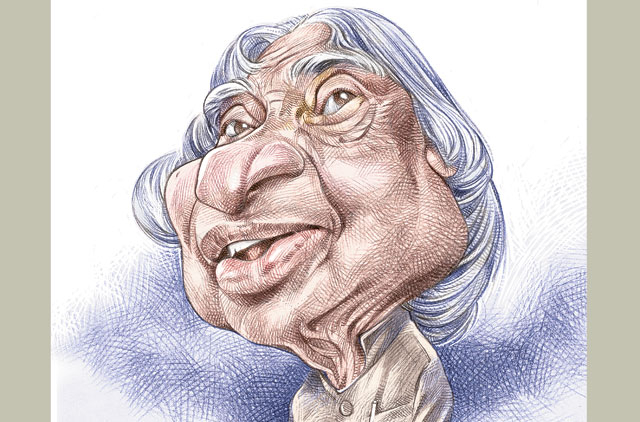
Delhi: He had no pretensions, no trace of arrogance.
He was not even euphoric — just the usual humble down-to-earth person that Avul Pakir Jainulabdeen Abdul Kalam, the world knows as Dr. A.P.J. Abdul Kalam, is.
The president-in-waiting was sitting on the floor of one of the guest houses of the posh Khel Gaon complex, built two decades ago as games village for 1982 Asian Games. He was declared elected as the 11th President of the Republic of India the previous day. However, he was totally unaffected by the biggest recognition the nation could have bestowed on him after conferring on him the highest civilian honour of Bharat Ratna in 1997.
He was his usual self, preferring to eat his breakfast comprising of some simple South Indian dishes such as idli on a banana leaf, as he always did while chatting with a group of journalists looking for some golden quotable quotes.
What Abdul Kalam had to offer to them, besides those idilis, was his vision for future India, a theme so dear to him.
One was never required to look beyond him to find an example of what being a simple person meant. Adhering to the motto of simple living and high thinking was one virtue that stood him apart from his peers whether as a student of physics at the St. Joseph’s College at Tiruchirappalli, at the Madras Institute of Technology where he did aerospace engineering or as one of the most popular scientists of the country.
Being as much adrift from politics as any apolitical person can be, it took him by surprise when his name was floated as the possible president of India by the Samajwadi Party chief Mulayam Singh Yadav. Yadav may have had his own reasons to prop up Abdul Kalam’s candidature since he had eyes on earning some brownie points by proposing name of a Muslim for the top constitutional post in the country. However, given the complex composition of the Electoral College where no party or alliance had a clear majority, such was Abdul Kalam’s stature that none had the guts to oppose him. Yadav’s proposal instantly met with approval by the then Prime Minister Atal Bihari Vajpayee who headed the Bharatiya Janata Party (BJP)-led National Democratic Alliance government. Even the principal opposition Congress party lent its support to him.
That Abdul Kalam still had to contest and get elected to the post in a heavily one-sided election against noted freedom fighter Lakshmi Sahgal since the Indian Marxists did not want to be seen on the same page as its ideological foe — the rightist BJP, which was in power then.
Abdul Kalam thus became the first and until now the only non-political person to become president of the country at the age of 70 in 2002.
Born on October 15, 1931, at Rameswaram district of Tamil Nadu (then Madras) to father Jainulabdeen, who was a boat owner, and his homemaker wife Ashiamma, Abdul Kalam had to start working quite early in life, even as a newspaper vendor, to supplement the family’s limited income as his parent’s represented the poor segment of the society.
None could predict that someone who used to get average grades in schools but was seen as a bright and hardworking student was destined to be a great scientist who came to be known as the Missile Man of India for his tremendous work in developing ballistic missile and launch vehicle technology. Abdul Kalam became a living legend in his life time as a scientist and seen as worthy successor to the likes of Homi J. Bhabha and Vikram Sarabhai. He also played a leading role in making India a nuclear power when the country under Vajpayee organised a series of nuclear tests in 1998, the first since India went in with its first nuclear test in 1974 with a touch-me-touch-me-not hesitation.
He was the chief scientific advisor to the prime minister and the secretary of Defence Research and Development Organisation (DRDO) from 1992 to 1999 and influenced the government to go in for nuclear tests.
The nuclear tests made both Vajpayee and Abdul Kalam heroes of the country. And it was more than a coincidence that Vajpayee appointed him as his constitutional boss as the president of India and for the first time in post-freedom Indian history both the president and the prime minister were bachelors.
To Abdul Kalam, India becoming a nuclear power was a step towards making India a developed country. Though not holding any position now, he is still working towards encouraging one and all and work for his undying dream of making India a developed country by the year 2020.













